The Hobbit: An Unexpected Journey: 50 Best Moments
Welcome back to Middle-earth (Warning: HUGE spoilers follow)
Gandalf And Galadriel Flirt
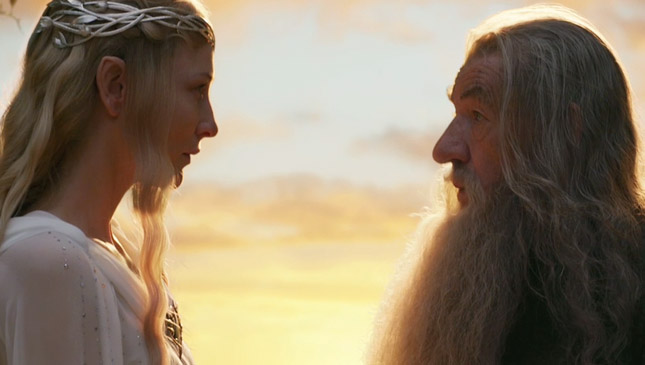
Considering one’s an ageing wizard, and the other’s a serene, near-expressionless Elf queen, no shortage of sparks fly when Gandalf and Galadriel are reunited after years apart.
On top of the hint that they shared a friendship in ages past, they exchange some choice glances and private telepathic banter.
But the most significant flirt shared is when Gandalf is distracting Elrond and Saruman, so that the Dwarves can sneak out and continue their journey onwards from Rivendel.
“You knew!”, her voice in his head chastises, although her eyes reveal a cheeky understanding.
Sebastian The Hedgehog
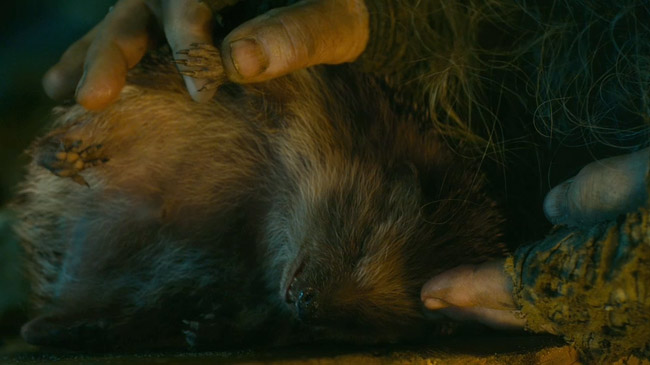
If The Lord Of The Rings trilogy lacked anything, and it wasn’t much, it would be cute creatures.
While there was no shortage of orcs, oliphaunts and horses, anything smaller, fluffier and more squee-inducing was harder to come by.
Not so in The Hobbit , thanks largely to Radagast’s devotion to the living creatures of the forest. In what’s simultaneously the cutest and most upsetting moment in AUJ , he attempts several restorative measures on the sickly, prickly mammal, including a bizarre smoking device.
In the end, it’s only via magic (and a blue gemstone), that Radagast’s able to remove the poison from the blighter’s body and stave off the spider’s that are at the door.
Sighs of relief all round.
Thorins Flashback
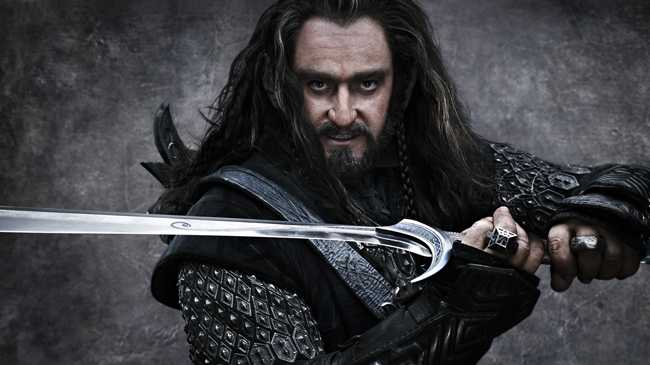
Thorin doesn’t take it lightly when Fili and Kili joke about an Orc attack, and as Balin explains, he’s got a pretty good reason.
The flashback to the Dwarves’ battle with the Orcs who tried to stake a claim in their homeland after it had been left unattended is another exquisite example of the world-building we witness in Middle-earth movies, weaving tangible detail into the historic tapestry.
In a design win, we glimpse younger versions of Thorin, Balin and Dwalin, showing the depth of imagination that’s gone into the dreaming up of these characters.
There’s a judicious blend of CGI and practical costuming among the foes, and an impressive variation in the armour design.
And, as Azog the Defiler cuts a swathe through the Dwarf hordes, it’s an extremely visceral battle on its own terms, and one of the signature uses of 48FPS: the countless warriors shimmering with detail and clarity in the format, in an unmatched combination of scale and clarity.
It’s another knock that’ll have you rooting for the homeless Dwarves, as there’s genuine emotion invested in the outcome, the number of dead “beyond the count of grief”.
Gandalf Kicks Ass
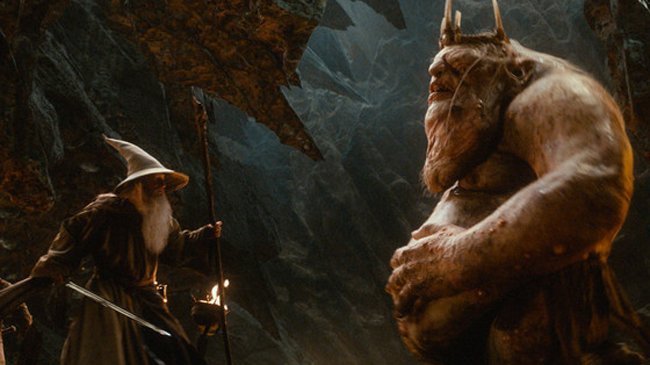
While he got involved in some wizard-on-wizard action in Fellowship , and put his staff to good use in The Return Of The King , Gandalf didn’t really get much hand to hand combat in LOTR after the Moria scuffles, which is why it’s such a pleasure to see him dispensing beasts inside the Misty Mountain.
He leads the fighting in the Goblins’ kingdom, after they’ve broken free from the Great Goblin, swinging sword and staff to extraordinary effect, and refusing to cheat with magic.
But his coolest moment comes when he gives one of his slimy assailants a razor sharp slice across the neck.
If you were in any doubt about whether or not the strike connected, Gandalf demonstrates that it most certainly did, by nudging the goon with his staff so that its head rolls clean off.
Sign up for the Total Film Newsletter
Bringing all the latest movie news, features, and reviews to your inbox
No Place Like Home
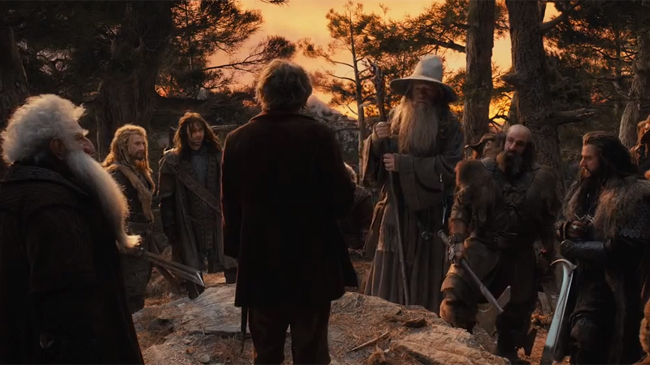
The Hobbit has plenty of moving moments (not many effects-heavy blockbusters can make that claim), but perhaps the most powerful is Bilbo’s reason for sticking out the rest of the journey as the Company’s burglar.
After escaping the Misty Mountain, and gathering in a (relatively) safe place, Bilbo slips off the ring to reveal himself to his fellow questers.
Yes, he misses the comforts of Bag End, but that’s because it’s his home.
He’ll journey on because the Dwarves don’t currently have one, and he’ll help them reclaim it if he can.
Delivered in a perfectly unheroic manner by Martin Freeman, it’s a neat ending: not only does it round out a nice first-movie character arc and call back to Bilbo’s decision to leave the troupe in the mountain, it strikes the same level of profundity as Samwise Gamgee managed to achieve at the end of Fellowship and Two Towers , acting as both a conclusion, and a fresh start for the next chapter.
Log Line
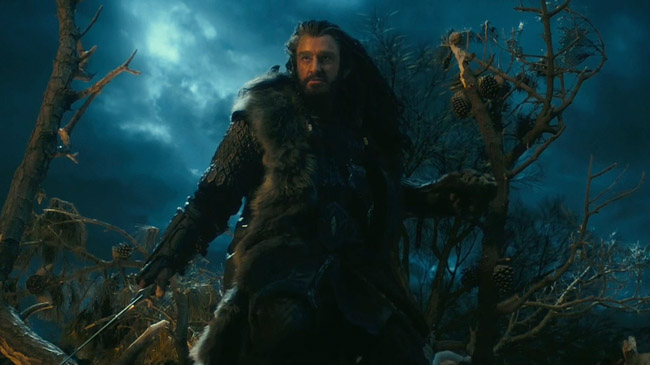
Throughout An Unexpected Journey , Thorin prove himself an immaculate badass.
An intense mix of Aragorn and Boromir, he has the former’s dark brooding stare and royal lineage, and the latter’s arrogance and tough, distinctly northern, severity.
He even managed to best Aidan Turner in the hunky Dwarf stakes, winning over a new bunch of ‘Team Thorin’ swooners.
His coolest moment echoes across the films, in the dual moments in which he uses a tree branch as a shield.
In the flashback battle against the Orcs, he’s going toe-to-toe with Azog, and coming off the worse.
In a moment of pure macho badassery, he grabs the stump and uses it as a shield holding back Azog until he’s able to slice his arm clean off.
And as if that moment wasn’t cool enough, Thorin reveals that he’s had the life-saving twig appropriated into an actual shield when he faces off with Azog at the movie’s climax.
It’s handy to have a constant reminder of your fortitude and resourcefulness to carry around with you, in case you get into any scrapes.
We’re guessing it’s the inspiration behind the name Oakenshield.
Put A Ring On It
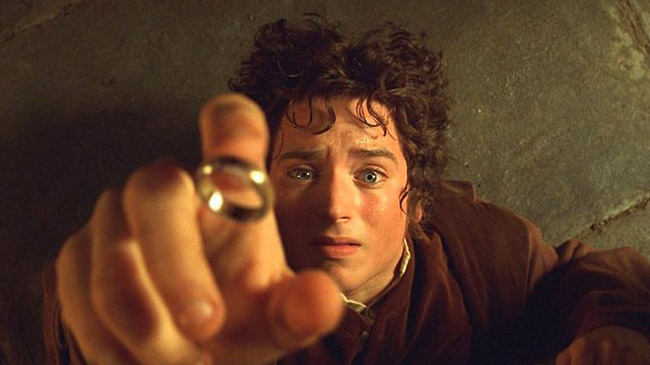
One of the most direct visual references to the LOTR trilogy comes when Bilbo, having barely escaped Gollum’s clutches, trips backwards and tumbles onto the floor.
The ring is tossed into the air and lands on his upwards-grasping fingers, rendering him invisible.
It’s almost identical to the way in which Frodo catches the ring during a brouhaha in The Prancing Pony in Fellowship .
Linking the cousins’ arduous journeys, and acting as a portentous omen for the impact the ring will have on Bilbo’s life (we all know what it did to Frodo), it’s a striking and unexpected shot, but thoroughly welcome.
Enter The Dragon
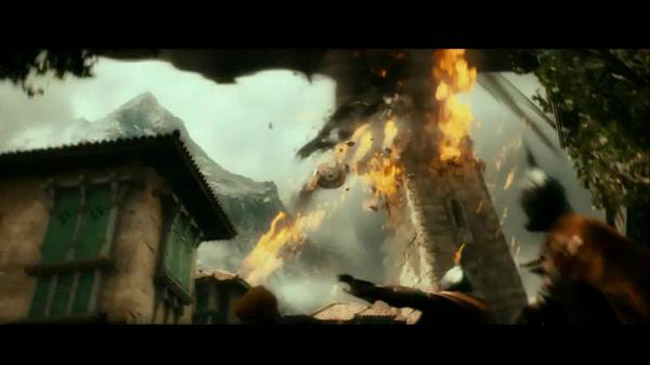
Jackson’s LOTR films have a nice line in prologues, and The Hobbit doesn’t disappoint on that front, as it tells the story of how Thorin’s grandfather Thror ended up losing Erebor - a vast kingdom-cum-goldmine - to a greedy dragon.
An impressive mini-story, it manages to establish the Dwarvish way of life, reveal how Thror is corrupted by his love of gold, and incorportate a fierily immediate dragon attack in the space of mere moments.
And throughout the sequences, Smaug the dragon is barely even glimpsed, save for a skyward silhouette, a claw here and there, and flames. Lots of flames.
It’s an astonishing sequences, and one that has us salivating at the thought of getting a proper look at Smaug in action in later installments.
The prologue also plays host to the obligatory Peter Jackson cameo, though as the beardy auteur blends in so well with his Dwarvish cohorts, he’s not the easiest to spot.
Riddles In The Dark
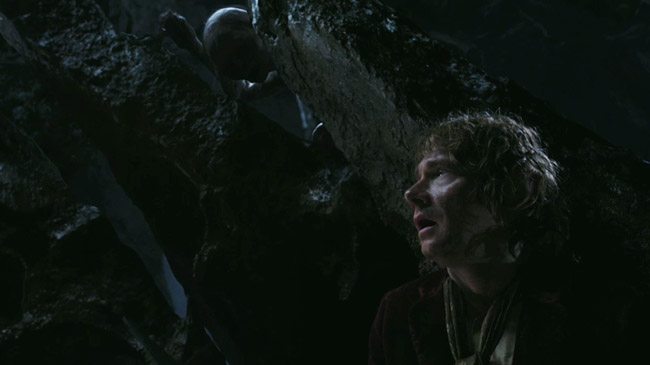
Undoubtedly the dramatic high point of the film, the ‘Riddles In The Dark’ segment doesn’t waste the book’s only Gollum moment, giving LOTR ’s most complex character another chance to shine.
For such a brief, self-contained scene, it doesn’t leave you wanting.
FX aficionados get Gollum looking more vibrant and tangibly textured than ever before, with a staggering amount of precision in his facial expression (and he gets to run through many here).
Seriously, he puts a lot of humans to shame.
Secondly, Martin Freeman is at his very best in what’s essentially a two man play (and let’s not forget, he’s acting opposite a Second Unit director in a mo-cap suit).
Bilbo’s fear, wit, intelligence and trepidation come alive through him, and his face bears the weight of so many emotions when he holds his sword at Gollum’s throat (with Gandalf's earlier advice about true courage no doubt reverberating around his head).
Despite the scene’s confinement, it shares remarkable links with the larger story elements.
Gollum’s internal (or should that be external) debates with himself hint at what’s to come, and his betrayal by a ‘Bagginses’ sheds new light on his encounter with Frodo in The Two Towers , with the type of additional backstory that deepens, rather than cheapens, the characterisation that follows.
And Jackson’s doesn’t attempt to recreate Bilbo’s discovery of the ring from the Fellowship prologue, opting to retell the event anew.
Through The Dragons Eye
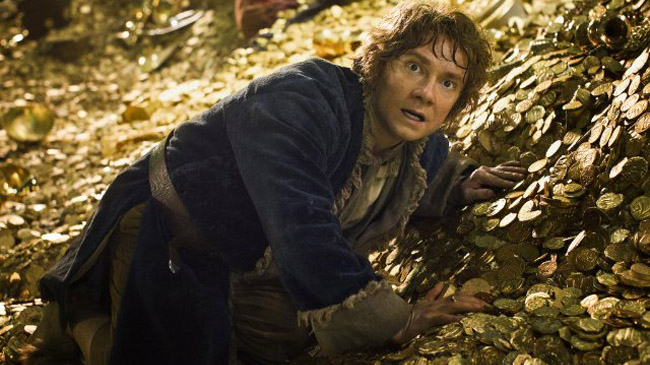
If you've somehow landed on this page by accident, the following is a highly spoilery.
Please don't read on if you haven't seen The Hobbit: An Unexpected Journey . Go to the totalfilm.com homepage .
For our money, ‘Riddles In The Dark’ has to be the best overall moment in AUJ , but somehow this feels like the more fitting moment to end on.
Dripping in tension, anticipation, dread and excitement, the closing frames of the film give us the briefest glimpse into Smaug’s eye.
And what an eyeball!
A pile of gold coins stream away to reveal a leathery, red-blue eyelid, that bursts open to reveal a giant bulbous eye (itself shrouded in a cat-like set of inner eyelids) that looks phenomenal in 3D (and, in fairness, it looked pretty staggering in 2D, too, the glossy digital orb gifted with an incredible real-world ‘weight’ by the special effects team).
The build-up only adds to the moment too, as a tiny bird makes its way to the abandoned kingdom of Erebor, and starts attempting to crack a nut outside.
Bilbo’s comment about the worst being behind them looks set to be proven fatally ill-judged.
Roll on The Desolation Of Smaug , and another glorious Christmas release of a Middle-earth film.
What were your favourite Hobbit moments? Any you’d care to add to our list?

I'm the Editor at Total Film magazine, overseeing the running of the mag, and generally obsessing over all things Nolan, Kubrick and Pixar. Over the past decade I've worked in various roles for TF online and in print, including at GamesRadar+, and you can often hear me nattering on the Inside Total Film podcast. Bucket-list-ticking career highlights have included reporting from the set of Tenet and Avengers: Infinity War, as well as covering Comic-Con, TIFF and the Sundance Film Festival.


